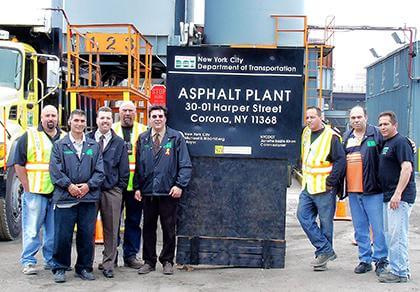By Chauncey Alcorn
Mayor Michael Bloomberg came to Corona Monday to officially announce the grand opening of a new municipally owned asphalt plant, which officials said will save the city up to $5 million a year on street resurfacing and pothole repair. It sits a mere block or two away from Willets Point, notorious for its unpaved roads and chassis-challenging potholes.
Located at 30-01 Harper St. in Corona, the new plant is only the second city-owned asphalt facility. The other is in Brooklyn. It is expected to greatly increase the amount of city-produced asphalt used to upgrade thoroughfares in the five boroughs.
By increasing the city’s use of recycled asphalt pavement — or RAP — the new plant is expected to save about $5 million annually in asphalt purchase costs, according to the city Department of Transportation.
“The new facility will allow us to resurface and repair more streets faster, in a more environmentally sound fashion and at a lower cost at a time when we are looking at all possible options to reduce expenses,” the mayor said. “By producing more recycled asphalt, we’ll avoid 2 million miles of annual truck trips that are used to carry milled asphalt to landfills, reducing congestion, pollution and wear-and-tear on our streets.”
The plant is located a stone’s throw from Willets Point, a 62-acre plot of land populated by manufacturers, auto repair shops and other industrial businesses.
On the city’s slate of places due to get a makeover in coming years, the city is working to upgrade the area by relocating or purchasing businesses in the area to make way for a multibillion-dollar mixed-use development project. The area is ridden with crater-like potholes as much as a foot deep that turn into deep, dangerous pools of murky water whenever it rains.
Janette Sadik-Khan, commissioner of the DOT, said the new plant will help the city keep pace with design and repair demands without sacrificing time and money.
“Continued investments that combine the safety and good repair of our streets with the need to reduce our city’s carbon footprint are helping New York City remain an international leader in sustainable practices,” she said.
The city paid $30 million in March to purchase the plant, which will produce 250,000 tons of asphalt a year and increase the city’s RAP production by 25 percent, according to officials, who also anticipate saving more than a million barrels of oil annually. The plant also will house paving and street repair equipment, permitting faster dispatching to the Bronx, Queens and northern Manhattan, officials said.
The city’s first asphalt plant, on Hamilton Avenue in Brooklyn, is scheduled to be renovated with upgrades to increase RAP production. The DOT said that plant has saved the city about $10 million annually by producing about 500,000 tons of asphalt per year since it was bought in 1981. The new plant is scheduled to reach full operation capacity a year from now.
Reach reporter Chauncey Alcorn by e-mail at calcorn@cnglocal.com or by phone at 718-260-4564.
































